Thesis
The emergence of AI, particularly LLMs, has been a major catalyst for the legal tech industry, as an obvious use case of LLMs directly mirrors the core functions of lawyers. Lawyers often act as "LLMs in the flesh"; they gather and analyze vast amounts of documents and data, distill key insights, and construct persuasive arguments or structured agreements based on precedent and logic. AI-powered legal tools are attempting to automate many of these processes at scale, from contract analysis and due diligence to legal research and predictive analytics. This shift is driving efficiency gains, reducing costs, and challenging the traditional billable-hour model, prompting law firms and legal service providers to rapidly adopt AI-driven solutions to stay competitive. Consequently, AI is not just augmenting legal work, it is fundamentally reshaping the industry’s structure and economic incentives.
COVID-19 served as another major tailwind for the legal tech industry by forcing law firms, courts, and legal professionals to embrace cloud-based collaboration and remote work solutions. One 2022 report showed a 32% increase in adoption by solo practitioners over the prior year. Historically resistant to change, the legal sector was suddenly compelled to adopt digital tools for virtual hearings, electronic case management, and secure document sharing. This shift not only proved the viability of remote legal work but also accelerated investment in cloud-based legal software, e-discovery platforms, and AI-powered contract management systems. The COVID-19 pandemic therefore underscored the inefficiencies of traditional, paper-heavy workflows and rigid office structures, pushing the industry toward greater technological adoption.
Rising legal costs and the growing access-to-justice crisis in the United States are further accelerating the adoption of legal tech solutions. The US fares poorly in civil justice accessibility, ranking 107th out of 142 countries in 2024, with high legal fees preventing many individuals and small businesses from obtaining necessary legal services. Additionally, the legal industry faces acute labor challenges, including attorney shortages and rising labor costs. A 2022 report revealed that one in five lawyers under 40 were considering leaving the legal profession.
Meanwhile, billing rates for top talent have begun to surpass the $3K/hour mark. In response, states like Utah are pioneering regulatory reforms that permit non-lawyers and alternative legal service providers to handle certain legal matters, demonstrating that legal work can be delivered at lower costs without sacrificing quality. Virtual delivery centers (VDCs) and alternative legal service providers (ALSPs) are also becoming more popular, providing specialized talent and scalable resources for implementing legal tech solutions cost-effectively. These pressures push firms to improve efficiency and work with fewer people, while widespread regulatory experiments and tech-enabled alternatives may reshape the legal industry by normalizing cost-effective solutions
The demand for integrated and user-friendly solutions is also shaping the legal tech market. Drafting in Microsoft Word may soon be a thing of the past. Lawyers are looking for tools that are easy to access and use and that seamlessly integrate with their existing systems. They need platforms that can manage all aspects of their practice, from research and e-discovery to document management and client interaction. Client portals that improve communication and collaboration are also seen as increasingly important, while the use of word drafting assistants is growing. Cloud-based collaboration tools are also making it easier for lawyers to work remotely, sharing documents and staying in sync with colleagues and clients. Inefficient knowledge management is costly, and integrated platforms provide a solution.
Despite the potential for technology in the legal sector, it has historically been overlooked by the tech and VC industries, which have considered it too slow to adapt and too risk-averse for meaningful investment. Moreover, there are ethical concerns that have obstructed progress. Rule 5.4 of the American Bar Association’s Model Rules of Professional Conduct restricts nonlawyer ownership, profit-sharing, and investment in law firms, aiming to protect lawyers' professional judgment but ultimately limiting innovation and affordability in legal services. The former is rapidly changing, the latter remains to be resolved.
Filevine is riding these structural tailwinds as the legal industry shifts from disconnected, document-based work to structured, data-driven workflows. Traditional legal processes rely on static documents, limiting efficiency and automation. Filevine’s case-centric architecture transforms legal work into structured data, enabling seamless collaboration, automation, and AI-driven insights. This shift not only enhances productivity but also positions Filevine as the foundational operating system for modern law firms, with expanding opportunities in practice management, AI tools, and industry-wide standardization.
Founding Story
Co-founders Ryan Anderson (CEO), Nathan Morris (CSP & CCO), and Jim Blake (CTO) founded Filevine in 2014 in Las Vegas, Nevada, and later in 2020 moved headquarters to Salt Lake City, Utah. As co-founders of Bighorn Law, Anderson and Morris encountered significant challenges when trying to find software that could support their growing law firm. Anderson related his prototypical experience in a letter on Filevine’s website:
“Several years ago, I sat in my office as a young lawyer feeling overwhelmed. The barrage of deadlines, emails, filings, client appointments, hearings and depositions seemed unrelenting. All of these things had to be done at a high level of quality, punctuality, and detail. Legal careers depend on accuracy, professionalism and follow-through. I felt the weight of those responsibilities every day.”
The work product of lawyers is documents. While academics publish papers for a living, they typically aren’t juggling twenty at once, each impacting lives and livelihoods. Keeping things straight is crucial. Anderson continues:
“The claims on my time were unforgiving. And yet, so many of my challenges were unrelated to actual legal work. I remember getting questions from clients, knowing the answer was ‘somewhere in the file’ but could not be found. I’d delegate an assignment to a paralegal, only to follow up a week later and have him tell me he didn’t remember the assignment. I’d wake up in the middle of the night convinced I had missed a deadline, only to find out an extension had been granted without my knowledge.”
The existing solutions either required integrating multiple, disconnected systems or forced them to completely overhaul their workflows to fit rigid, predefined processes. These systems didn’t address the complexity of Bighorn Law’s work, which often involved managing intricate tasks, maintaining constant communication, and overseeing cases that could span months or even years. Frustrated by these limitations, Ryan and Nathan realized they needed a more tailored solution.
In 2014, Anderson met Jim Blake, an experienced engineer, and the two immediately clicked. Blake’s engineering expertise and Anderson’s understanding of the legal field came together, setting the foundation for a custom solution. Together with Morris, they founded Filevine, aiming to create a software platform that could streamline workflows, enhance communication, and support the full lifecycle of legal matters.
Sean Dowdle (CRO) joined the team in 2018 after tenures at companies such as Adobe, and (the brother of the CEO) Michael Anderson (CPO) joined in 2018 after five years at Goldman Sachs.
Product
What started as a task management platform for law firms evolved over time into today’s complete product suite, which Filevine describes as a “complete legal tech stack, supercharged by AI,” as well as an “all-in-one, end-to-end platform” that covers “the entire legal matter lifecycle.” Unlike its predecessors, Filevine decided to treat the “case” as the centerpoint of its software ecosystem. This case-centric architecture makes Filevine indispensable, to the extent that some law firms “live inside” of Filevine.
One of Filevine’s core capabilities for next-gen legal practice is its bi-directional sync, allowing drafted documents to save directly to case files while automatically pulling case information, like names, amounts, and dates, into drafts. One of the largest headaches in legal drafting has always been the laborious process of manually transferring these details. When fresh-out-of-law-school lawyers can bill close to $1K an hour at Big Law firms, there’s no reason such mundane, repetitive tasks should consume valuable time that could be better spent on higher-level legal work.
With AI entering the scene, Filevine is approaching what one author has dubbed “tridirectional sync” wherein “work can be initiated anywhere and update everywhere.”
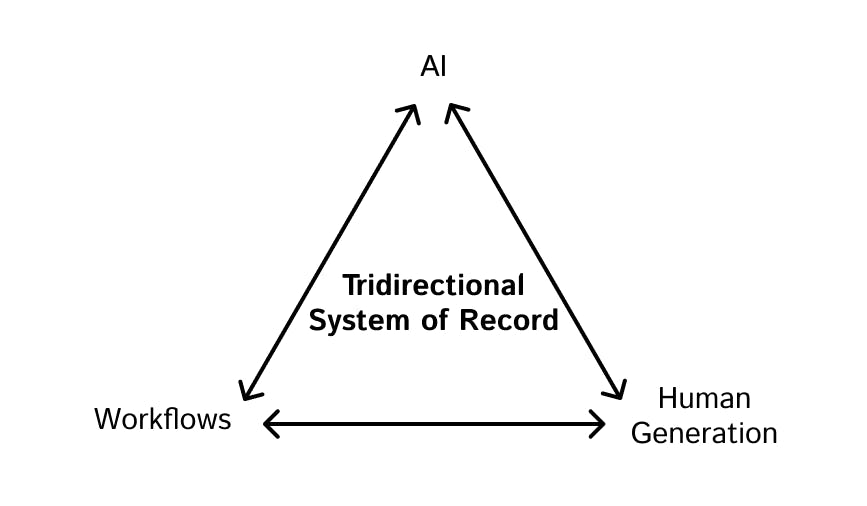
Source: Verticalized
Case Management Software
Filevine's Case Management Software is a comprehensive legal practice management platform designed to streamline law firm operations. It offers features such as case and document management, client communication tools, and time and billing functionalities, all within a centralized workspace. The software is customizable to fit various legal workflows, enhancing efficiency and collaboration among legal teams.
Lead Management
Filevine's Lead Management Software is designed to streamline the client intake process for law firms. It captures leads from various sources into a centralized platform, ensuring no potential client is overlooked. The software offers customizable intake forms, automated workflows, and AI-powered tools like LeadsAI, which provides predictive analysis and lead summaries to expedite and simplify legal intake and lead management. By optimizing lead management and marketing efforts, it helps firms increase conversion rates and maximize return on investment.
Document Management
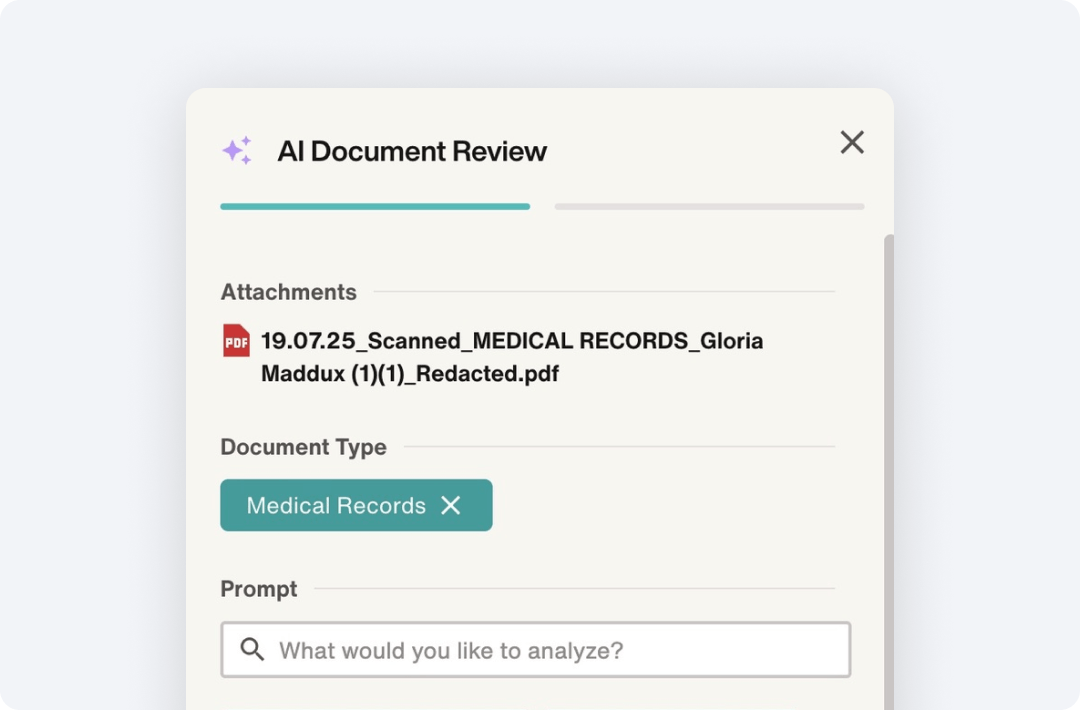
Source: Filevine
Filevine's Document Management Software, known as Docs by Filevine, is a cloud-based solution tailored for legal professionals to streamline document workflows. It offers unlimited storage, advanced search capabilities with Optical Character Recognition (OCR), and robust security features that allow one-click document sharing and collaboration. Additionally, Docs by Filevine integrates AI-powered tools like DocReviewAI to expedite document analysis and provides built-in antivirus protection for enhanced data security.
Contract Management
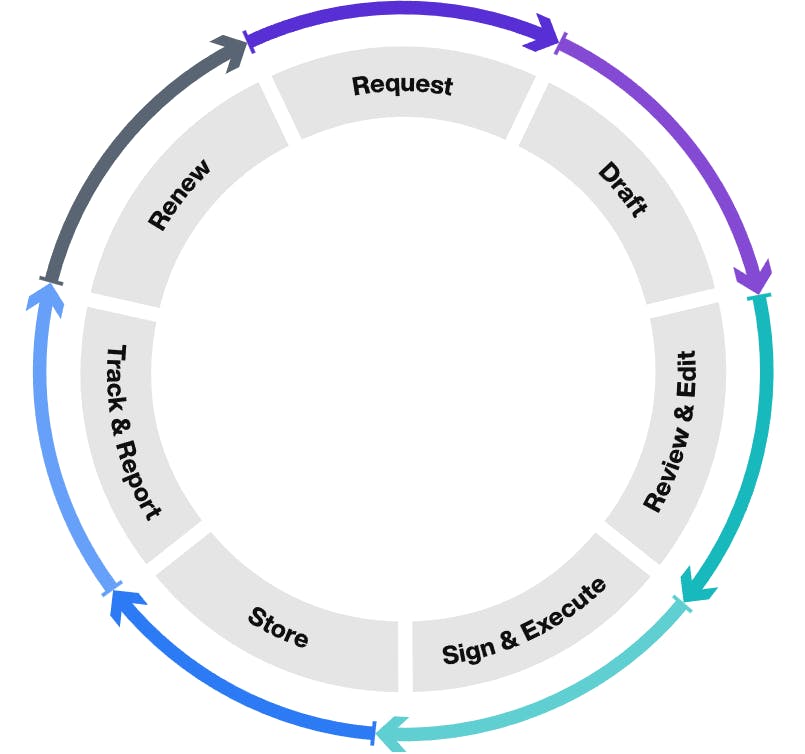
Source: Filevine
Filevine's Contract Management (CLM) software simplifies and streamlines the entire contract process, from creation to execution and storage. With an advanced legal template system, users can effortlessly draft accurate and efficient contracts. The platform enhances collaboration through intuitive workflows, real-time negotiation, and seamless mobile eSigning. Contracts are securely stored in an AI-powered metadata repository, allowing for quick and intelligent searches.
Additionally, the system enables full automation of contract operations through no-code integrations, giving teams the flexibility to manage agreements from anywhere. By combining powerful drafting, collaboration, security, and automation features, Filevine CLM empowers legal teams and businesses to reduce risk, increase efficiency, and optimize their contract management processes. Filevine’s CLM came via acquisition of Outlaw in 2021.
Business Analytics
Filevine's Business Analytics platform empowers law firms to make data-driven decisions by providing actionable insights into various aspects of their operations. By surfacing data on hiring, caseloads, staff performance, and overall firm success, it enables firms to enhance efficiency and profitability. The platform offers customizable automated reports and data visualizations, allowing firms to monitor key performance indicators and optimize their workflows.
Time, Billing, and Payments
Filevine's Billing and Timekeeping software streamlines legal billing by automating time tracking, invoice generation, and payment processing. It offers features such as automated time tracking, customizable billing rates, and integration with accounting software like QuickBooks. The platform also provides secure online payment processing, allowing clients to pay via credit card or ACH transfer directly within the case management system. This approach enhances efficiency, reduces manual errors, and accelerates revenue collection for law firms. With lawyers sometimes only billing a dismal 29% of billable work, this feature offers immediate and substantial benefits to a firm’s bottom line.
eSignatures
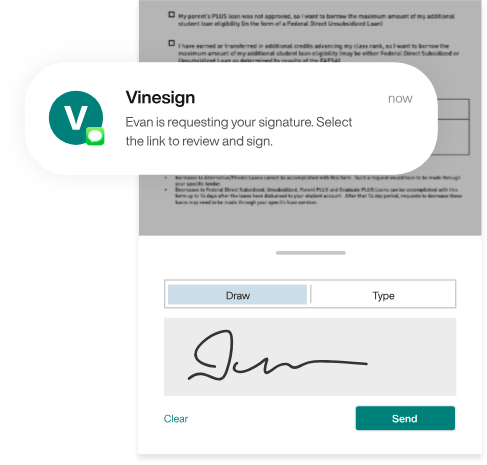
Source: Filevine
Filevine's eSignature solution, Vinesign, streamlines secure, mobile-friendly document signing. With text message prompts and a mobile-optimized experience, clients can sign anytime, anywhere. Users can create templates for recurring documents and send bulk requests to up to 1K recipients. Customizable signing order and a reusable custom field library simplify workflows. Fully integrated with Filevine and Lead Docket, Vinesign syncs completed documents automatically with case files. Independently audited for SOC 2 Type II compliance, it is designed to ensure security and privacy, and complies with electronic signature standards, including the ESIGN Act, UETA, and GDPR, so that documents are legally binding and admissible in court.
Document Assembly
Filevine's Document Assembly is a legal document creation and automation solution designed to streamline the drafting and management of legal documents. It utilizes the proprietary .vine document format, enabling dynamic templates with connected variables and a content library of commonly used legal clauses. This approach reduces template complexity, enhances customization, and minimizes the risk of human error by eliminating redundant data entry. The platform integrates seamlessly with Filevine's case management system, allowing for automatic synchronization of documents and information, thereby reducing redundant data entry. Additionally, it offers features like audit logging, version control, and team-based permissions to enhance document oversight and control. For a visual overview of Filevine's Document Assembly features, see here.
AI Solutions
Filevine has rapidly rolled out a suite of AI products enabled and fast-tracked by its partnership with the LLM evals platform Humanloop. Each tool addresses a specific rote action or pain point of legal work.
DemandsAI is an AI-enhanced solution that helps law firms prepare demand letters. It uses case data and powerful AI to automatically draft demand letters, saving time on data entry and reducing errors. The AI extracts key details from case documents, such as injury details, procedures, dates, and treatments, as well as medical records and police reports. It leverages generative AI to assemble a strategic demand letter, emulating the firm's tone and writing style. The platform also offers unlimited live editing. This can help firms decrease turnaround time and save money.
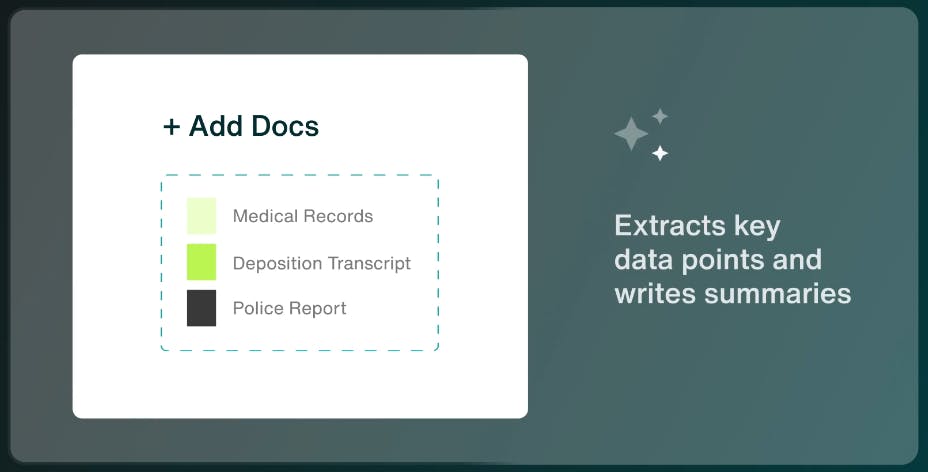
Source: Filevine
AIFields is an AI feature that can extract and summarize key information from documents in seconds. It uses optical character recognition (OCR) to scan handwritten notes and text in digital images. AIFields can be used to summarize depositions, identify themes, and list inconsistencies. It can also summarize police reports and create chronological lists of data from medical records. The tool can extract information from contracts, like termination and dispute clauses, and assist in legal due diligence during mergers and acquisitions. AIFields can extract case citations, parties involved, and legal precedents from court documents, and can categorize and tag documents for organization and retrieval. Additionally, the tool is able to enhance the efficiency of legal research by extracting and categorizing legal concepts and citations from legal articles.
ImmigrationAI, powered by Lawfully, is an AI-enhanced tool designed to expedite the immigration process. It automates tasks, reduces errors, and ensures accuracy when completing USCIS forms. The tool extracts information from documents in any language, helping to complete forms quicker. It can also track case status updates. ImmigrationAI translates client questionnaires into up to 170 languages. The tool is designed to streamline the immigration process and make it easier for both attorneys and clients.
SidebarAI is a personal AI assistant that engages in chat conversations to provide support and guidance on using Filevine. It can summarize cases and provide the user with immediate answers to their "how to" questions. The AI-powered chatbot can generate summaries of the past seven days of activity on each case. It can also assist in creating processes and workflows within Filevine.
Market
Customer
Filevine's customer base has evolved significantly from its roots in personal injury law. The company has successfully expanded into several adjacent practice areas. This expansion reflects Filevine's ability to serve diverse practice areas while maintaining its focus on high-volume, document-intensive legal work.
The platform serves law firms of all sizes, from solo practitioners looking to automate administrative work to Big Law firms with hundreds or even thousands of attorneys requiring sophisticated, scalable solutions. Mid-size law firms are strong potential customers for Filevine because these firms are often at an inflection point where scaling operations without increasing staff is desirable, making Filevine’s toolkit particularly appealing. But law firms are not the only customer. According to a 2023 report, the breakdown of legal tech market share was 52% law firms, 31% corporate legal departments, and 17% others.
Market Size
The global legal technology market size was estimated at $26.7 billion in 2024 and is expected to grow a CAGR of 10.2% from 2025 to 2030 to reach $46.8 billion in value. The eDiscovery market, meanwhile, was estimated at $15 billion in 2023 and is expected to grow at a CAGR of 10.7% from 2024 to 2030. Platforms like Filevine, by boosting efficiency and reducing costs, are also poised to tap into latent demand for legal services at levels never before seen. In essence, the existence of Filevine and its competitors is likely to expand the legal market by reaching previously underserved client segments
Competition
Competitive Landscape
Few competitors of Filevine, other than Clio, offer an established, comprehensive, end-to-end platform that parallels or matches Filevine’s full suite of capabilities, although some are trying. However, rather than facing direct, all-encompassing rivals, Filevine contends with a growing number of specialized legal tech companies, each targeting a specific function within its ecosystem. For example, contract review tools like Evisort and Spellbook, legal drafting solutions like CoCounsel, and AI-driven research tools like Harvey all seek to capture market share in their respective niches (other examples could be vastly multiplied). This fragmentation of competition means that even if no single company were to challenge Filevine as a whole, the proliferation of specialized solutions presents an ongoing challenge as law firms consider integrating best-in-class point solutions instead of adopting an all-in-one platform.
Clio
Founded in 2008, Clio was a first mover in the field and remains a leading provider of cloud-based legal technology designed to streamline law firm operations. Clio Manage serves as its core law practice management system, providing tools for case management, time tracking, billing, and secure document storage. Clio Grow focuses on client intake and CRM, streamlining lead management, intake workflows, and client communications. For document automation, Clio Draft enables firms to efficiently generate legal documents. Clio Accounting offers legal-specific accounting tools to ensure compliance and financial management. Additionally, Clio supports 250+ third-party integrations, allowing firms to customize their workflows with apps for esignatures, accounting, and automation.
The company has raised a total of $1.3 billion in funding as of August 2025, having raised a $900 million Series F led by New Enterprise Associates at a $3 billion valuation.
Evenup
Personal Injury law (PI) is a particularly competitive vertical in the legal tech space. While Filevine is not entirely reliant on the PI segment, PI is its original core business.
Founded in 2019, Evenup does not rival Filevine as a holistic offering, but is an AI-powered legal technology platform focused on capturing the PI segment. Its Demands feature automates the creation of AI-driven demand letters. MedChrons provides comprehensive medical chronologies, ensuring a complete treatment history for each case. Executive Analytics offers critical performance insights, helping firms manage operations effectively. With Case Preparation, Negotiation Preparation, and Settlement Repository, attorneys can take more strategic, data-backed approaches to settlements. At the core of Evenup is Piai, an AI trained on a PI dataset to assist attorneys in making accurate case evaluations.
Evenup has raised $220.5 million in total funding as of August 2025. It raised a $135 million Series D led by Bain Capital Ventures at a $1 billion valuation in October 2024.
Business Model
Filevine operates a standard SaaS business model with pricing determined by the number of users, along with optional feature add-ons, integrations, and additional products. Its subscription tiers are designed to offer flexibility and scalability for firms of varying sizes. Pricing plans are tailored to meet the specific requirements of each organization.
Traction
Filevine claims that its solutions lead to 4x the referrals, expand case capacity by 25%, speed up contract generation by 76%, and can save firms 433 hours per year by automating one task. As a result, Filevine has achieved rapid growth in its early years, having achieved 2,269% revenue growth over the five year period preceding September 2024.
As of 2024, the platform served over 1.5K law firms and legal departments across the US and Canada. Every month, as of 2024, approximately 300K new clients were helped by lawyers who use Filevine. As of April 2025, Filvine claimed to have over 150K legal professionals using its platform.
Filevine has also conducted a number of strategic aquistions, including the acquisition of Lead Docket in 2020 and Outlaw in 2021. In April 2025, Filevine announced the acquisition of Parrot, which it described as a “full-stack platform for transcribing, scheduling, and managing depositions”, in order to expand its AI offerings.
Valuation
Filevine has raised a total of $226.1 million as of August 2025. In April 2022, the company raised a $108 million Series D led by StepStone Group at an undisclosed valuation. Other investors in the company include Signal Peak Ventures, Meritech Capital Partners, Golub Capital, Element Ventures, and Jonathan Ord.
Key Opportunities
Horizontal SaaS Expansion
Filevine has significant opportunities for horizontal expansion beyond law firms, particularly into industries that rely on process-driven workflows and extensive documentation. Government agencies can benefit from Filevine’s robust document automation, task management, and data tracking capabilities to streamline case handling and regulatory compliance. A new era of intense scrutiny on government efficiency in the US began in 2025, causing agencies across the board to scramble to figure out how to do more with less personnel.
Similarly, compliance-heavy corporate departments, such as those in finance or healthcare, can leverage Filevine’s automation and reporting features to ensure regulatory adherence and operational efficiency. Insurance claims management departments, which handle high volumes of claims and require precise documentation and communication, are another natural fit. By expanding into these sectors, Filevine can broaden its customer base while capitalizing on its strengths in managing complex, document-intensive workflows.
Deepened Vertical Specialization
Filevine has a significant opportunity to deepen its vertical specializations by developing tailored solutions for specific practice areas, building on the progress it has already made. For instance, M&A law firms could benefit from custom workflows designed for due diligence tracking, deal structuring, and document management. Family law practices could see value in enhanced case timelines, custody agreement templates, and financial disclosure tools. Employment law firms may require expanded compliance tracking and workplace investigation templates.
By refining these vertical solutions, Filevine can better serve the unique needs of various legal segments, strengthening its value proposition and positioning itself as the go-to platform for niche markets. This continued specialization may not only drives deeper adoption but could also creates cross-selling and upselling opportunities across tailored product lines.
Acquisition
Filevine’s growth has been accelerated by strategic acquisitions along the way, including the acquisition of Lead Docket in 2020 and Outlaw in 2021. This growth trajectory makes it a prime target for acquisition, especially as legal technology giants continue to consolidate and expand their market share.
One of the most compelling potential buyers is Thomson Reuters. The company has been aggressively investing in AI-driven legal research and workflow automation, as evidenced by its $650 million acquisition of Casetext in 2023. Beyond Reuters, other major players in legal tech and enterprise software could see value in acquiring Filevine. Companies like LexisNexis, which has built its own suite of legal workflow tools, might view Filevine as a way to expand its footprint in the legal practice management space. Additionally, private equity firms looking to consolidate the fragmented legal tech industry could see Filevine as a high-growth asset with significant upside potential.
For any potential acquirer, Filevine represents more than just a software platform; it’s an entry point into a growing market of firms seeking cloud-based, AI-enhanced legal management solutions. As legal professionals increasingly demand more automation, integration, and efficiency, a company like Reuters might see acquiring Filevine as a way to stay ahead.
Prosecutor Vacancy Crisis
One example of a pressing situation that platforms like Filevine could alleviate is the prosecutor vacancy crisis in the United States, as detailed in a 2024 research article. Across the country, district attorney’s offices are struggling to retain and replace prosecutors, with vacancy rates exceeding 15% in cities like Houston and Los Angeles and reaching 33% in Miami. Low salaries, overwhelming caseloads, lack of remote work options, and burdensome discovery obligations have driven many prosecutors to leave. These shortages threaten public safety and harm defendants, as overworked junior attorneys struggle to manage cases effectively, leading to wrongful detentions and Brady violations due to inadequate training and time constraints. Filevine could provide the foundation to aid an overworked prosecutorial workforce.
Key Risks
Legal Challenges
Ironically, significant risk Filevine faces stems from potential resistance and legal challenges from the legal industry itself, particularly as the platform's automation capabilities expand. The legal profession has historically shown vigorous opposition to technologies that could be perceived as practicing law without a license or undermining traditional legal service models. This pattern is evident in LegalZoom's experience, where the company has faced numerous legal challenges from state bar associations and regulatory bodies questioning whether its services constitute unauthorized practice of law.
Similar challenges could emerge for Filevine, especially if its automation features begin to replicate functions traditionally performed by attorneys. While Filevine has positioned itself as a tool for lawyers rather than a replacement, any expansion into more automated document generation, legal analysis, or client advisory capabilities could trigger protective responses from the legal community, potentially resulting in costly litigation and regulatory scrutiny.
AI Backlash
AI has the potential to make mistakes. In 2023 a federal judge fined two lawyers for using bogus ChatGPT case-law research. Other judges have begun issuing orders for disclosure of AI usage. General LLMs are particularly bad at case-law research, hallucinating to the tune of 69% - 88% of the time. While there are ways to mitigate these risks, irresponsible implementation by some actors could trigger regulatory backlash that impedes legitimate innovation.
The American Bar Association's role in establishing ethical guidelines for AI use in legal practice will be crucial, particularly regarding data privacy and security when feeding sensitive case information into AI systems. Looking ahead, the prospect of AI-versus-AI legal arguments could fundamentally alter the nature of litigation in ways that may face resistance from the judiciary and legal traditionalists.
Transition Period for SaaS
Another significant strategic risk facing Filevine is the potential transformation of the traditional SaaS model, as highlighted by Microsoft CEO Satya Nadella's comments in January 2025 about the emergence of AI agents. Nadella suggests that business applications will fundamentally change in the agent era as AI agents begin directly interfacing with databases through APIs rather than through traditional user interfaces. This shift could pose challenges for traditional SaaS platforms like Filevine, as the business logic currently embedded in SaaS applications may migrate to an "AI tier" where AI agents orchestrate tasks across multiple databases and systems.
While Nadella doesn't predict the death of SaaS entirely, he envisions a future where successful SaaS platforms will need to optimize for AI agent interactions rather than human user interfaces. This evolution could require significant architectural changes to Filevine's platform and may impact how the company delivers value to its customers, particularly as competitors emerge with AI-first approaches to legal practice management.
Summary
Filevine is reshaping legal tech by offering a comprehensive platform that streamlines legal practice management. Founded in 2014 by attorneys frustrated with existing solutions, it has evolved from a task management tool into an end-to-end system that organizes work around cases. The company benefits from key industry tailwinds, including AI adoption, increasing cost sensitivity, remote work demands, and the need for integrated solutions. Its expanding product suite covers case management, document handling, billing, analytics, and AI-driven automation. With a 2,269% revenue increase over five years and a client base of 1.5K+ firms, Filevine has seen significant traction.
This transformation mirrors advancements in programming languages, where stronger compilers boosted developer productivity. Similarly, Filevine shifts lawyers’ roles by reducing time spent on administrative work, allowing greater focus on case strategy and substantive legal work. Just as modern programming paradigms enable developers to work at a higher level, Filevine expands lawyers’ capacity beyond generating citations and medical summaries to more strategic thinking. By replacing traditional document-heavy processes with AI-powered, structured data workflows, Filevine intends to help the legal industry move faster, handle more cases, and ultimately deliver better outcomes for more people.


